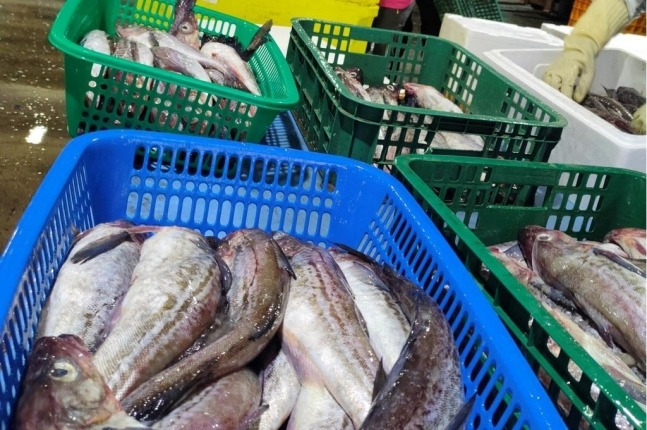Food & Beverage
Russian fresh pollock imported for first time at Donghae Port
It's alternative to Japanese products due to concerns over radioactive water released from Fukushima nuclear power plant
By Apr 21, 2023 (Gmt+09:00)
2
Min read
Most Read
LG Chem to sell water filter business to Glenwood PE for $692 million


Kyobo Life poised to buy Japan’s SBI Group-owned savings bank


KT&G eyes overseas M&A after rejecting activist fund's offer


StockX in merger talks with Naver’s online reseller Kream


Mirae Asset to be named Korea Post’s core real estate fund operator



As Korean cod, which had been considered everyone's fish, has virtually disappeared, Russian fresh pollock has finally become available to Korean pollock enthusiasts who had only been able to access it through dry cod.
According to the Donghae Logistics & Industry Foundation and Doowon Merchant Marine on Friday, 10.9 tons of Russian pollock, which was loaded on the Eastern Dream that arrived at Donghae Port on the day, is scheduled to be shipped nationwide as soon as customs clearance is completed.
Since the complete ban on domestic pollock fishing in 2019, the domestic pollock market has been entirely dominated by Japanese imports.
Last year, about 1,628 tons of refrigerated pollock were imported, all from Japan. In terms of value, the market was worth $5.43 million.
As fresh seafood, pollock must be on consumers' tables within 7 days of being caught, so the entire process from harvesting to packaging, transportation, customs clearance and distribution must be carried out quickly and systematically.
For this reason, it has mainly been imported from countries close to Korea geographically, and in the case of Japanese pollock, it is caught in Hokkaido, transported to mainland Japan, and shipped to the entire country via Busan Port.
However, concerns are growing about the possible hazard to the domestic seafood market if Japan releases contaminated water from its nuclear power plant in Fukushima, as it has announced it may do so this year.
The Donghae Logistics & Industry Foundation has been promoting the import of Russian pollock since the beginning of this year in order to secure alternative supply routes for Japanese fresh seafood importers and shippers, and the latest import of pollock is the first outcome of that effort.
Until now, Russian pollock has mainly been exported in the form of frozen fish, but a major fishing company in Primorsky Krai saw the potential for the Korean pollock market and showed interest in exporting, which led to connections with domestic companies looking for alternatives to Japanese pollock.
Russian pollock has the advantage of being able to arrive in Korea within three days if shipped on the Eastern Dream, which travels between Vladivostok and Donghae, because it arrives at a coastal factory within 2 hours of being caught and is packaged for export.
However, the car ferry that operates the Vladivostok-Donghae route has higher fares than container-only ships, and therefore, the route was shifted to Busan in February and March this year. However, the import through Donghae Port finally became successful as the ferry company made a decision to offer discounted fares, considering long-term possibilities.
Write to Ji-Yoon Yang at yang@hankyung.com
More to Read
-
 Business & PoliticsS.Korea's fisheries ministry to transfer tech on Napoleon fish to SE Asia
Business & PoliticsS.Korea's fisheries ministry to transfer tech on Napoleon fish to SE AsiaFeb 01, 2023 (Gmt+09:00)
2 Min read -
 Food & BeverageDrones, AI, big data power Korean fisheries’ earnings
Food & BeverageDrones, AI, big data power Korean fisheries’ earningsAug 17, 2022 (Gmt+09:00)
2 Min read
Comment 0
LOG IN


